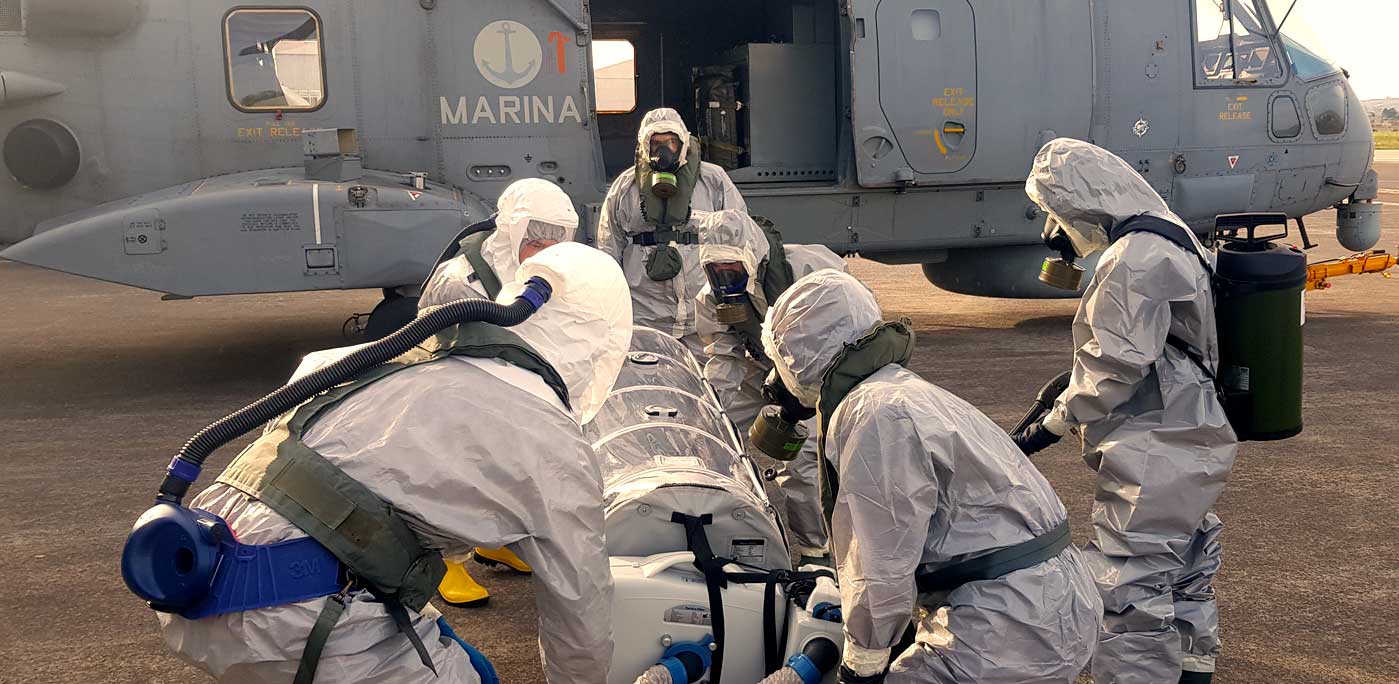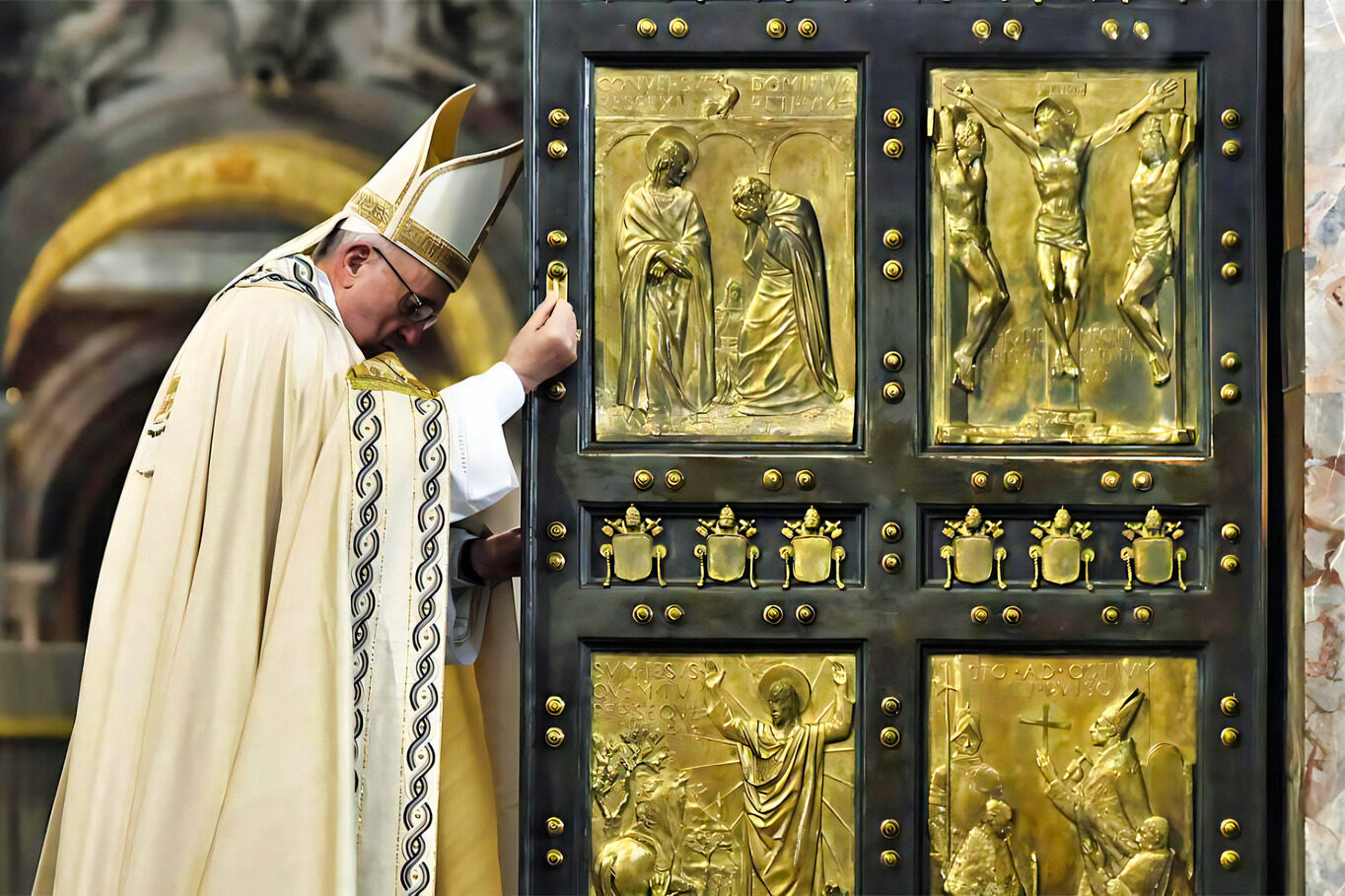Everything started with the Aeronautica Militare’s first flights to bring back home all the Italians living in China. They lived, worked, studied in Wuhan, in that far away, incredibly modern province where a virus we believed distant had begun killing. But closing our airports was not to be enough to protect our country. We couldn’t even imagine what was to happen from the 2nd of February onward.
The repatriation of the first 56 Italians, on board of a KC767, part of the 14th Flock of our Aeronautica Militare, the medical screenings supervised by the Spallanzani hospital, where the first two Covid-19 patients in Italy were cared for — two Chinese tourists who were to be discharged 49 days later — the quarantine in the military citadel of Cecchignola: everything was just a short prelude to what was to come.
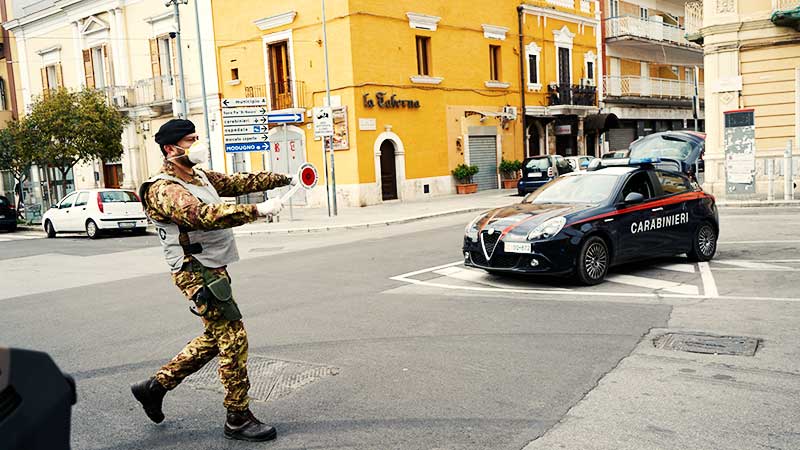
(Photo courtesy of the Stato Maggiore della Difesa)
The whole system, though, had been mobilized already: the Ministry for Health, the Ministry of Foreign Affairs and International Cooperation, the Farnesina’s crisis unit, the Ministry of the Interior, the Protezione Civile (which depends from the Prime Minister, but is a capillary and extremely well organized entity present all over our territory), the Ministry for Defense, the Operational Command of the Armed Forces, responsible for the organization and use of our Army.
Antibodies: operational against panic.
But that 20th of February, when Italy discovered her patient one, the state of emergency becomes official. Two days earlier Mattia, 38, a young, athletic sportsman, went to the Codogno hospital ER, where he was diagnosed with mild pneumonia and was told to go back home. But his health quickly deteriorates and, within a handful of hours, he ends up intubated in an ICU bed. He’ll start breathing on his own again only on the 9th of March. In the meanwhile, outside that small hospital near Lodi, Mattia’s positive test to coronavirus unleashed a storm upon the country.
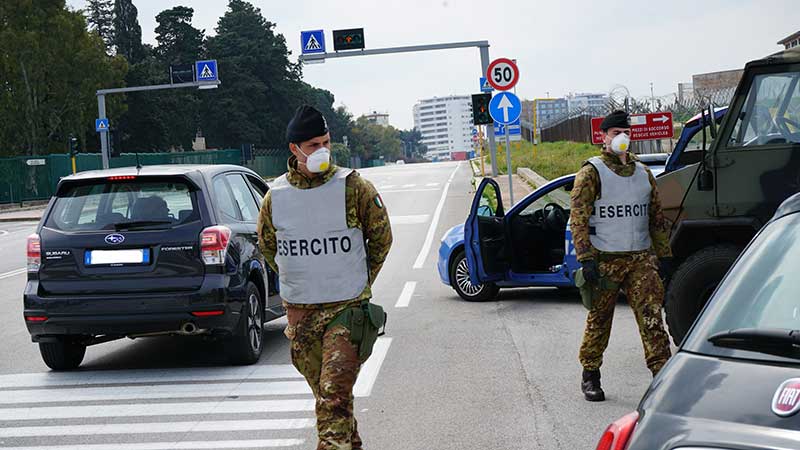
(Photo courtesy of the Stato Maggiore della Difesa)
The useless chase for our patient 0, leaves space to the attempt to isolate clusters that seems to pop up everywhere within “red areas” always too small to contain them all. And indeed, they won’t be enough to stop Covid-19 from spreading. From then on, it’s all about the fury of a tiny, incredibly powerful virus that kills more than 27.000 people in two months, makes positive to tests over 200.000 and infected an unknown number of Italians (some say official data cover only about 10% of the real amount of positives), in spite of the superhuman efforts of our doctors and nurses, all of a sudden thrown into war trenches.
They fight with resiliency, but without proper equipment and with unequal weapons, against an unknown, invisible enemy that kills 800-900 people per day, every day. It’s agony, it’s an unsustainable effort for hospitals where masks, coats, respirators, ventilators, oxygen and medications are insufficient. It’s David against Goliath.
That’s when solidarity comes in. Volunteers of all ages start bringing food and essentials to the elderly, to the poor, to those who can’t move; local authorities put into place every type of social assistance; 8.000 doctors and 10.000 nurses from all over Italy offer their help to their exhausted colleagues, those working in hospitals about to collapse. This happens at the end of March.
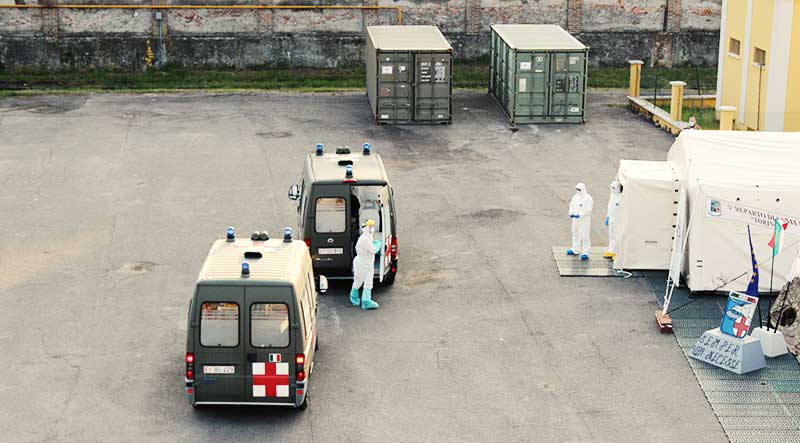
(Photo courtesy of the Stato Maggiore della Difesa)
Our Armed Forces began working immediately: trained, organized, prepared. Regular training sessions and simulations have been crucial for the protection of our collectivity. The first 500 soldiers were deployed on the 25th of February; on the 3rd of March, the Ministry for Defense makes 2.200 rooms and 6.600 beds available in military hospitals across the country, while the Marina Militare takes part to the rescuing of the passengers on the Diamond Princess, the cruise ship docked in Yokohama, Japan, with its heavy burden of infected.
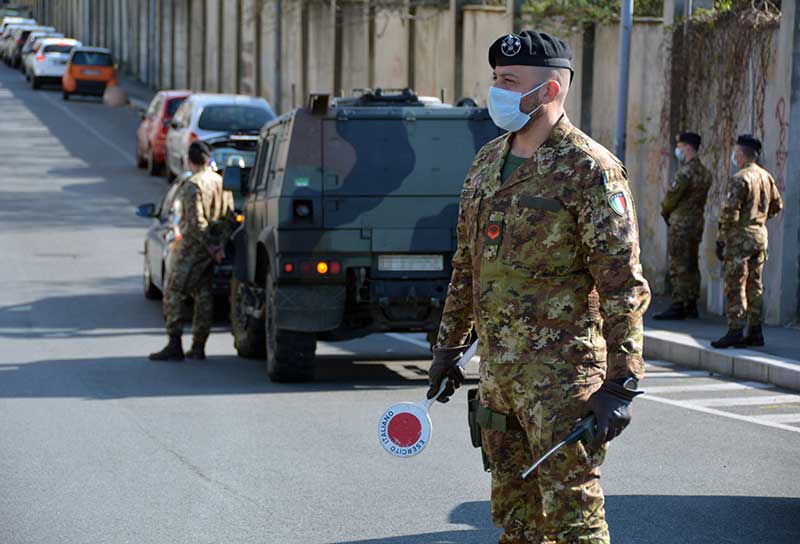
(Photo courtesy of the Stato Maggiore della Difesa)
On the 8th of March, Italy welcomes the yellow — just like mimosa flowers — bio-containment suits worn by our specialized army women and men: soldiers trained to fight bacteriological wars move patients from a region to another with last generation HH-101A helicopters, used for the transport of highly infectious patients. The medical and nursing staff of our Army, our Navy, our Air Force and Carabinieri brings help to the hospitals in Lombardia that have been struggling the most.
7.000 soldiers bring their support to our police at checkpoints all over the country, to make sure the necessary “staying home,” essential for both public health and our survival, is respected. At the end of March, they are in Campania and Sicily, where social unrest caused by restrictions is registered: they even station in front of supermarkets, to avoid thefts and robberies.
These reactions hurt all those fighting on the frontline: they feel like treason when, in the meanwhile, Italy cries bitter tears watching military convoys parade through thestreets of Bergamo: not backup, but the Covid-19 dead, carried to neighboring regions to be cremated. There were too many infected bodies to be taken care of in the local cemetery.
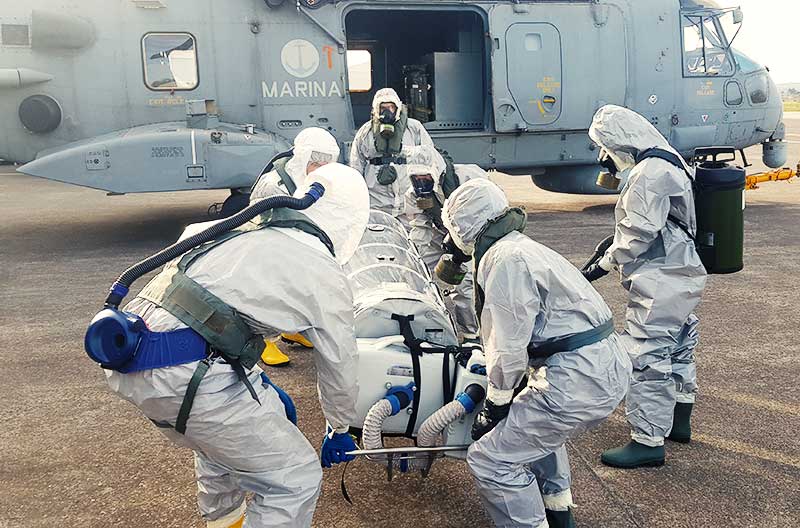
Army forces at work for the transport of a Covid-19 patient from a hospital to another during the pandemic (Photo courtesy of the Stato Maggiore della Difesa)
Shocking images that portray the sense of tragedy in a suspended time where there are no funerals and pain is made even larger, just like President Mattarella said, by not being able to be near our loved one neither in hospital, nor when it’s time to say goodbye. An “enormous” pain also when it comes to its numbers, with Italy mourning, at the end of April, one third of the world’s victim. Around Easter, Lombardia alone counts over 73.000 of the 200.000 recorded infections, and neighboring regions of Emilia Romagna, Piemonte and Veneto reach 141.000 positives.
But our Armed Forces fight also on the back lines.
The Army’s Genio Ferrovieri regiment guarantees goods can travel safely on rail. The Military Pharmaceutical and Chemical Plant of Florence produces daily 1000 liters of disinfectants and hard-to-find bactericides. In the Bologna area, specialists from the Azienda Industrie Difesa share their expertise with Valsimoggia’s Siare Engineering, a world leading biomedical company that, aware of bringing upon itself heavy losses, decided nevertheless to stop all exports and produce solely for Italy: in a handful of days, the production capacity for pulmonary ventilators, essential technology in the ICUs and sub-ICUs wards in the whole country, is multiplied.
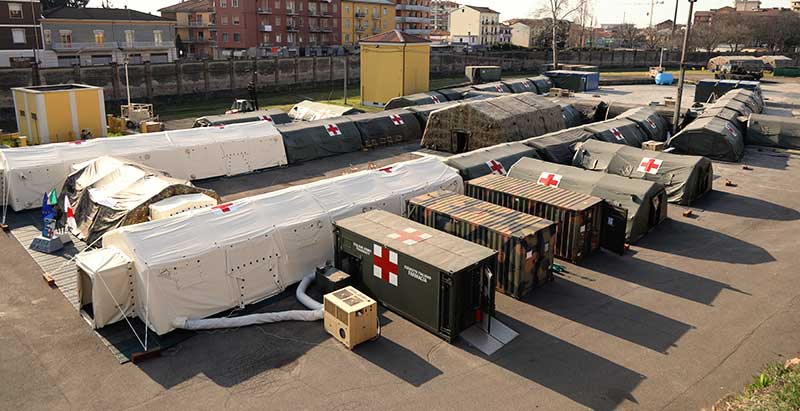
(Photo courtesy of the Stato Maggiore della Difesa)
Even when, at the end of April, things begin to improve, commitment is strong: the Italian Air Force’s Reparto Sperimentale di Volo concludes its work on mask-and-snorkel sets, transforming them in protective gear to be used in hospitals, and donates a first batch to the Policlinico Casilino in Rome on the 17th of April. On the 21st, the La Spezia’s Arsenale and the Centro di Supporto e Sperimentazione Navale join the effort, too.
The Comando Operativo di Vertice Interforze, in charge of coordinating all of our Armed Forces, creates a Covid-19 Operational Room that works 24/7. The logistic effort is immense: more than 800 vehicles, ambulances, an helicopter fleet with negative pressure stretchers located in Rimini; 5 helicopters with health teams for bio-contained patients at the military airports of Cervia, Viterbo and Catania; 69 air missions with 220 tons of material handled as of the 21st of April; everywhere, the sanitization of streets, vehicles and infrastructures is carried out, along with the decontamination of residences for the elderly, the most fragile and at risk of all health structures in the country.
The number of beds equipped for patients who do not require intensive care quickly exceeded 6.800. About 200 military doctors and nurses work in the hospitals of Lodi, Alzano, Bergamo, which are among the most affected and under pressure, together with Castelnuovo Bocca d’Adda, Somaglia, Codogno and Casalpusterlengo. But they also bring their support in Parma, Macerata, Milan and Novara. The facilities of the military hospital in Milan, the Military Olympic Sports Center, the military hospital of the Celio and the field hospitals of Piacenza and Crema are made available, set up in just 72 hours by the Army and equipped with all the satellite and IT technologies necessary to manage sensitive patient data very quickly.
Operativity, chain of command, but also training, preparation and spirit of sacrifice for the country make the difference. International emergency simulation training, carried out in cooperation with foreign countries was fundamental, also when it came to coordinate and liaise with Chinese, Cuban, Russian and Albanian doctors, among the first to arrive to help Italian colleagues. The same goes for missions abroad: the logistics used in Afghanistan, Iraq, Lebanon or Kosovo are used to set up, for the first time at home, 12 city hubs with land and air vehicles.
Active service experience also makes a difference. In Bergamo, the Associazione Nazionale degli Alpini (ANA) proved it when, in ten days, it equipped a field ER with 140 intensive and sub-intensive care units, resuscitation units, a radiological unit, fixed and mobile CT scanners, oxygenation system, and decontamination room which will work for at least 6 months. “We are aiming for a 98% reduction of infection risk — explains Sergio Rizzini, director general of the Alpini Healthcare — because the teams of doctors and nurses are a finite force: we must preserve it.” Traditional hospitals, overcrowded and not equipped, have shown that they cannot guarantee this: healthcare workers are more than 10% of the positives to Covid-19 and, among them, there are already more than 150 victims, half being family doctors.
Proximity also counts a lot: Carabinieri bring to the elderly unable to leave the house their pension and deliver Easter gifts to hospitalized children to restore moments of normalcy. A coat or uniform makes no difference when it comes to the spirit of service.
“We are always committed, with all our energies, to provide concrete answers every day to an emergency that has unfortunately affected the habits and lifestyles of an entire nation. I am deeply proud — said Chief of Defense Staff, General Enzo Vecciarelli — of what the men and women of our Army, Navy, Air Force and Carabinieri have been giving on the field: we’ve never been so close to the primary needs of the country’s people.”
#UnaForzaperilPaese says their hashtag. There is a war to be fought and an effective system, capable of counterattacking, is necessary. Our Armed Forces are doing it with professionalism, but also with a lot of heart.
